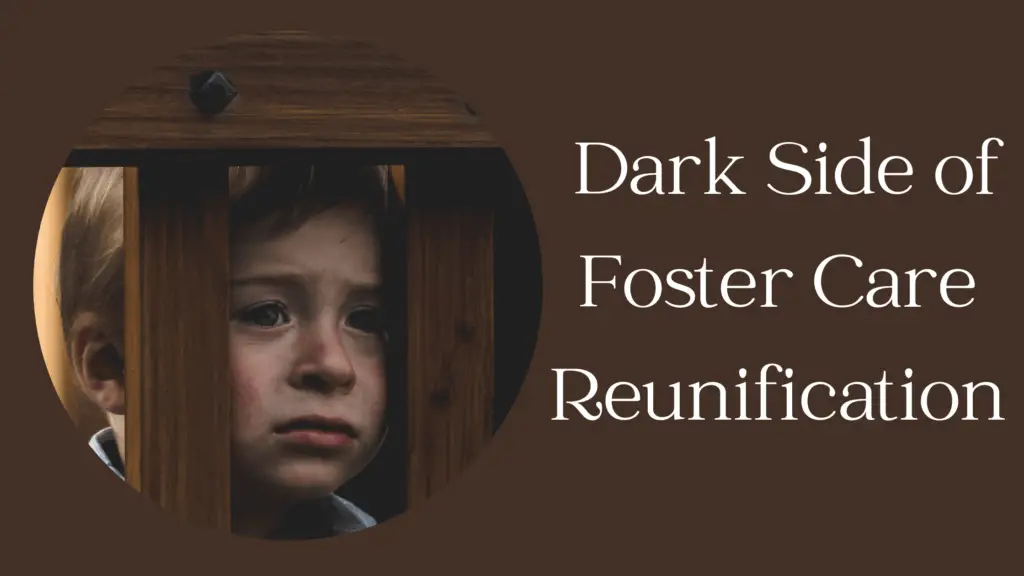Foster care serves as a crucial safety net for children who have experienced abuse, neglect, or other forms of harm within their biological families. At the heart of the foster care system is the aspiration of reuniting children with their biological parents, driven by the belief in family preservation and the idea that parents can evolve and overcome the challenges that led to their children’s removal. While the principle of reunification holds noble intentions, it’s imperative to recognize that this path isn’t always in the best interests of the child. There are instance when reunification becomes detrimental to a child. To ensure the child get the best, it is for the greater good to understand why reunification in foster care is bad.
The Idealistic View of Reunification
The foster care system’s bedrock principle revolves around the concept of family preservation, grounded in the belief that, with appropriate assistance and interventions, parents have the potential to overhaul their lives and create secure, nurturing settings for their offspring. While this optimistic perspective stems from the principle of affording parents an opportunity for redemption, it may not consistently harmonize with the practical imperative of guaranteeing a child’s safety and welfare.
Reunification relies on the premise that parents can adapt their behavior and improve their circumstances. Certainly, numerous parents do show remarkable progress in this aspect, underscoring their dedication to establishing a secure and affectionate environment for their children. Nevertheless, the belief that every parent can attain such a transformation can occasionally be excessively hopeful.

The potential for harm to children during the reunification process cannot be overlooked. When parents have not adequately addressed the underlying issues that led to their child’s removal, reunification may unintentionally place the child at a heightened risk of experiencing additional abuse or neglect.
Why Reunification in Foster Care Is Bad
Some of the key reasons why reunification in foster care is bad are:
- When the biological family has not made the necessary changes to address the problems that led to the child’s removal in the first place.
- When the child has developed a strong bond with their foster family.
- When the biological family is not supportive of the child’s needs.
1. Emotional and Psychological Trauma
Children entering foster care have often experienced trauma that led to their removal from their biological families. The instability associated with reunification can significantly exacerbate their emotional and psychological distress. The constant transitions between environments and caregivers can engender a sense of insecurity, anxiety, and fear in children already grappling with the aftermath of trauma.
2. Disruption of Emotional Bonds
An often underestimated aspect of foster care is the formation of strong and deeply meaningful emotional bonds between children and their foster families. Foster parents frequently emerge as the primary source of stability, affection, and support for these vulnerable children. When the goal shifts towards reunification, the possibility of rupturing these vital emotional connections presents a considerable emotional challenge for the child.
Repetitive Cycles of Abuse and Neglect
In situations where parents have not effectively addressed the issues that led to their child’s removal, the process of reunification can inadvertently perpetuate a distressing cycle of abuse and neglect. Children may be returned to environments that remain unsafe, subjecting them to further harm. Tragically, this cycle of abuse can persist, with children trapped in an unrelenting cycle of suffering.
The Burden on Foster Parents
Emotional Strain
Foster parents invest not only their time and resources but also their hearts and emotions in caring for children in need. The emotional toll of reunification, particularly when it is not in the child’s best interest, can be overwhelmingly devastating for foster families. Bearing witness to the potential harm faced by a child they have come to love can be profoundly distressing.
Financial Pressure
Meeting a child’s needs, including housing, food, clothing, and education, often incurs significant expenses for foster parents. When the reunification process is prolonged, as it often is, foster parents continue to shoulder the financial responsibility, leading to financial strain in their own lives.

Specific Examples of When Reunification Can Be Bad
The potential harm stemming from reunification is further highlighted when examining specific scenarios:
When the Biological Family Has Not Made Necessary Changes
- When the biological parents have not completed the necessary treatment programs for their substance abuse or mental health issues.
- When the biological parents have a history of domestic violence.
- When the biological parents are involved in criminal activity.
- When the biological parents are unable to provide the child with basic necessities, such as food, shelter, and clothing.
- When the biological parents are not emotionally supportive of the child.
- When the biological parents are physically or emotionally abusive towards the child.
When a Strong Bond Has Developed with the Foster Family
In cases where a child has spent an extended period in foster care, they often form deep emotional bonds with their foster families. These bonds provide them with a stable, loving, and supportive environment. Reunification can be traumatic for the child as it may necessitate leaving behind the foster family and friends they have grown to rely on, creating significant emotional upheaval.
When the Biological Family Is Unsupportive of the Child’s Needs
Reunification can be harmful when the biological family is unsupportive of the child’s needs, particularly in cases where the child identifies as LGBTQ+ or has other unique needs. A lack of acceptance and support from the biological family can expose the child to discrimination, rejection, and emotional distress.
Read About: What Are Foster Parents Not Allowed To Do
Alternatives to Reunification
Adoption as a More Stable Option
Adoption offers a more stable and permanent home for children when reunification is neither feasible nor safe. It provides children with the opportunity to flourish in a loving family environment where their well-being is prioritized.
Kinship Care and Extended Family Support
Kinship care, where children are placed with extended family members, can provide a sense of continuity and familial support. This option maintains essential family connections while ensuring the child’s safety and well-being.
Establishing a Safety Net for Children
By investing in preventive measures, such as early intervention programs, comprehensive support services for families at risk, and accessible mental health services, we can weave a protective safety net for children long before the point at which they might face removal from their biological families. These initiatives are designed to tackle underlying issues and equip families with the necessary resources to cultivate safe and nurturing environments for their children.
Conclusion
While the noble goal of family preservation remains paramount, it must be harmonized with a genuine consideration of the child’s paramount interests. Reunification can become harmful when the biological family has not undertaken the essential changes, when deep bonds with foster families have been forged, or when the family is unresponsive to the child’s distinct needs.







